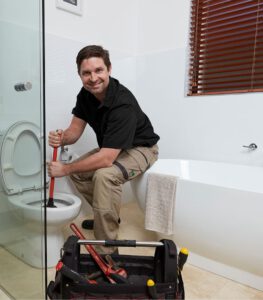Plumbers In Spring TX are an expert on water and drainage systems. Plumbing companies provide a range of services from drainage to installing potable water systems. However, before you hire a plumber, you should know what to look for in a professional. Below are some of the most common services provided by a plumber. Read on to learn more. A Plumber specializes in installing drainage and sewage systems. A plumber can also repair and install toilets, washing machines, and garbage disposal systems.

Plumbing jobs include installing, repairing, and maintaining pipe systems. They also troubleshoot and repair damaged or malfunctioning pipes. Plumbers may need to cut holes in walls or hang steel supports from ceiling joints to complete the job. To install pipes, they may also have to fit them precisely. Copper pipes may require soldering. As a plumber, you may be called upon to fix water or gas leaks. Plumbers also diagnose and fix any plumbing emergency.
The word “plumber” has roots in ancient times. Lead was commonly used in Roman water supply systems. The Latin word for lead, plumbum, is derived from this word. Since the concept of plumbing is such a complex one, plumbers are employed today using a variety of materials, including plastic, steel, and metal. Drainage work includes laying down pipes and securing stormwater. Plumbing professionals are also responsible for sewage treatment systems and sewerage services.
Plumbing involves installing water supply pipes to appliances and supporting plant growth. Most plumbers have extensive experience in customer service and problem-solving. However, this career has some physical requirements and isn’t for everyone. There have been a few challenges, and a plumber must be resilient. But with a positive outlook for the future, plumbing may become a booming industry. Despite the challenges, there are new buildings being constructed to meet stricter water efficiency regulations.
In most states, plumbers must hold a license in order to perform their work. To practice, plumbers must have between two and five years of experience and have passed a licensing exam. Additionally, plumbers must have soft skills, which are developed throughout their life experiences. They should be able to listen to the problems of their customers and identify the problem. They should also be skilled at troubleshooting, which is essential in the industry. As a plumber, you’ll also be dealing with other professionals, so it’s a good idea to choose a plumbing company that is reputable.
Plumbing is a highly regulated profession in states. Most states require plumbers to be licensed, and licensing requirements vary by state. Plumbers must undergo ongoing training and keep up to date with the latest trends in the industry. State-licensed plumbers carry state-mandated insurance and bonding to protect the public from damage caused by their work. The United Association website provides extensive information about the licensing requirements by state. Further, plumbers with valid licenses should also be insured to protect the homeowner from losses during plumbing repairs.
A plumber’s salary depends on their experience and training. Most plumbers learn their trade through apprenticeships, though some choose to attend a technical school to further their skills. Plumbing jobs typically pay above-average wages, but you can also earn more money by training yourself. For example, if you are a licensed plumber and want to become an engineer, you can become a certified professional in building services engineering. Depending on your qualifications, plumbers may even work on the side.
As a plumber, you may need to be comfortable with working in both indoor and outdoor environments. It requires physical strength and an understanding of how plumbing systems operate. You may have to handle heavy and dangerous materials. You should have a basic understanding of science and math. Plumbing jobs also require you to have a working knowledge of local codes. In addition, you may have to work in close quarters with other professionals to solve complex problems. A Plumber may work alone or in a team, so it is vital to choose a career path that will suit your goals.
A plumber can work in both the residential and commercial sectors. In addition to installing water and sewage systems, plumbers can work on clogged drains, install bathtubs, or replace old, corroded pipes beneath the bathroom floor. Plumbing has been around since ancient times. Before plumbing was available in copper, lead, and copper pipes, people used to lead. It was common to see plumbers repairing lead roofs as well. So, becoming a plumber is a rewarding career path.